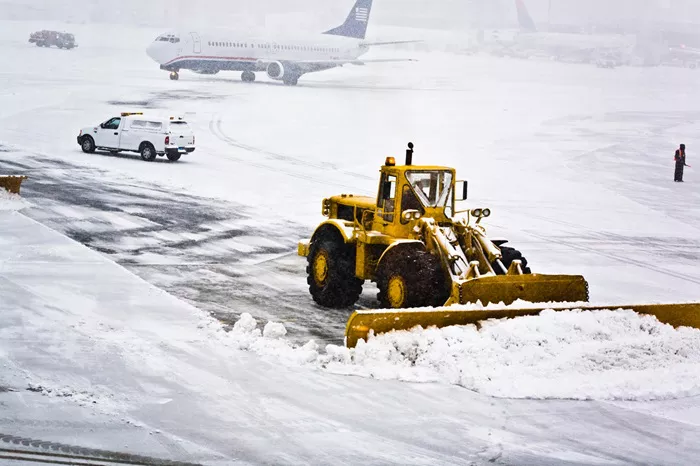Travelers across the United States are experiencing widespread disruptions as a powerful Arctic storm impacts air travel, roadways, and public transportation. Thousands of flights have been canceled or delayed, stranding passengers at major airports in cities like New York, Boston, and Washington DC. Freezing temperatures, heavy snowfall, and icy conditions have made both ground and air travel dangerous.
Passengers are urged to check for updates before heading to airports or starting their commutes. The storm is expected to cause delays and cancellations for several more days.
Arctic Cold Hits North-Central U.S.
A surge of Arctic air is sweeping through the north-central U.S., bringing subzero wind chills and strong winds. AccuWeather warns of harsh conditions, but temperatures are not expected to break records.
Travelers in affected areas can expect significant disruptions on highways, where icy roads are common. The National Weather Service (NWS) predicts temperatures will be much lower than average across the Northern Plains and Upper Mississippi Valley. The cold front will reach the Great Lakes and Ohio Valley by Thursday, further threatening road conditions. Although milder weather is expected by the weekend, drivers should stay cautious and keep up with travel advisories.
East Coast Braces for Arctic Blast
An Arctic cold front is also moving eastward, impacting the Great Lakes, Mid-Atlantic, and Northeast regions. This will bring a sharp drop in temperatures, with snow expected across parts of New England and the western Appalachian slopes.
Slick roads and reduced visibility are likely to create hazardous driving conditions. Travelers should be prepared for potential road closures and sudden snow squalls. Airlines in affected areas may also experience flight delays and cancellations due to icy runways and poor visibility.
Lake-Effect Snow Hits Great Lakes Region
As Arctic air moves over the warmer Great Lakes, it is triggering lake-effect snow, which is expected to impact areas downwind of Lakes Superior and Michigan. The snow will spread to regions near Lakes Erie and Ontario by Thursday.
Heavy snow is expected, with some areas receiving up to 2 feet of accumulation. Key regions at risk include western New York, northwest Pennsylvania, northeastern Ohio, and parts of Michigan. Roads in these areas will be hazardous, and air travel disruptions are likely, with delays and cancellations possible at nearby airports.
Severe Weather on East Coast Brings Flash Flooding
While the central U.S. faces freezing temperatures, the East Coast is dealing with heavy rain and thunderstorms from a powerful storm system. Flash flooding is a concern, especially in urban areas where intense rainfall may overwhelm drainage systems.
The storm is expected to disrupt public transportation in cities like New York, Boston, and Washington DC, causing delays on buses and subways. Although the rain may help alleviate drought conditions in some areas, it will cause significant travel disruptions. Commuters should stay updated on local transit delays and weather warnings.
Air Travel Severely Impacted
The Arctic storm has already caused widespread disruptions at major airports, including those in New York, Boston, and Washington DC. Thousands of flights have been canceled or delayed due to icy conditions and poor visibility.
At Boston Logan International Airport, there have been 84 flight cancellations and 266 delays. At Reagan National Airport in Washington DC, 52 flights have been canceled, and 311 delayed. Other airports have also seen significant delays, with more than 300 flights affected nationwide. Passengers are urged to check flight statuses before heading to the airport, as disruptions are expected to continue.
Road Closures and Hazardous Driving Conditions
The Arctic storm has caused major disruptions on highways, with ice, snow, and freezing rain creating dangerous driving conditions. Authorities have reported accidents, road closures, and traffic delays, especially in cities like New York, Boston, and Washington DC. Drivers are advised to use caution and expect longer travel times due to hazardous roads.
Public Transit Faces Delays
Public transportation systems in major cities are also affected by the storm. Subways, buses, and commuter trains are experiencing delays due to flooded tracks, slippery platforms, and weather-related slowdowns. Commuters in New York, Boston, and Washington DC are facing interruptions, and should monitor local transit updates before heading out.
Conclusion
As the Arctic storm continues to affect the U.S., travelers are facing significant challenges. With flight cancellations, hazardous road conditions, and public transit disruptions, passengers are advised to stay updated on the latest weather alerts and transportation advisories.
Related topics:
- Storm Darragh Disrupts UK Transport, Causes Widespread Power Outages
- Massive Snowstorm Disrupts Thanksgiving Travel Across the U.S.
- Heavy Snowstorm Disrupts Thanksgiving Travel with Up to Three Feet of Snow

